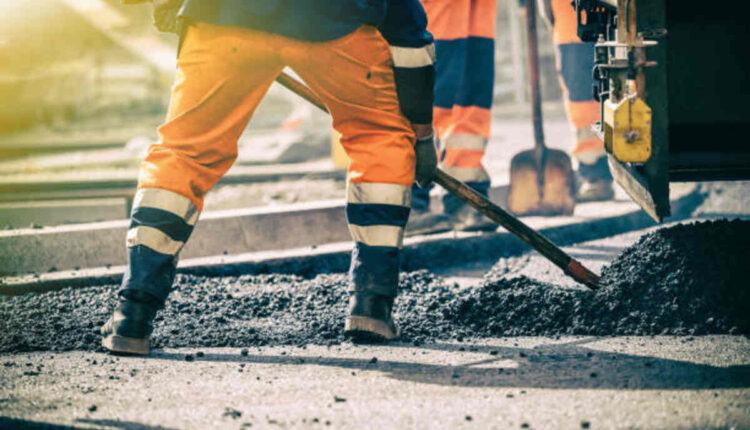Asphalt Repair and Paving
Asphalt repair and paving are integral to keeping a healthy commercial parking lot environment. Minor issues should be attended to to prevent structural damage and costly repairs later on promptly. Best way to find the Asphalt companies Stockton.
Raveling occurs when asphalt deteriorates, leaving an uneven surface that poses trip hazards and collects standing water – not only is this hazardous for tripper safety purposes, but the standing water may cause further damage to the pavement.
Patching
Asphalt patching entails filling potholes and damaged areas with cold or hot asphalt mix. Spray injection patching offers a faster and more efficient method for making repairs; using specialized trucks to apply an asphalt/aggregate mixture under high pressure produces instant compaction and longer-term patches.
Prior to commencing an asphalt patching job, all loose material must be cleared away from the affected area. Any damage must then be squared with either a hammer and chisel for small holes or a bulldozer for larger areas, graded, and filled using a patching mix selected and compacted firmly using either a vibrating plate or metal tamper; compacting ensures safety against trip hazards as well as longevity for the longevity of the patched surface.
Sealcoating the repaired area is another essential step, protecting it from weather, temperature shifts, and general wear and tear. A quality seal coat must adhere appropriately in terms of temperature and conditions for it to set correctly.
Resurfacing
Asphalt resurfacing can be an ideal way to extend the lifespan of existing pavement, saving money in repair bills in the future while eliminating inconvenience associated with removal and replacement of their current surface.
Resurfacing asphalt involves grinding off and replacing its top layer, then layering new asphalt on top. Prior to this step, any high or low areas must first be filled, while drainage features must also be adjusted appropriately.
Before installing new asphalt, a sticky layer called a “tack coat” must be applied first to help bind it with its surroundings. Next, crack sealant must be used to prevent moisture from entering subgrade layers through cracked surfaces and stop raveling edges from developing further. Finally, asphalt must be laid and rolled using heavy equipment so as to create an even surface.
Small block cracks of less than 1/2″ wide that do not feature severe raveling are generally repairable with cold patch products available at most home improvement stores. An asphalt contractor should professionally assess larger cracks or depressions to ascertain the source of their defect and propose an extended-term solution.
Removing
Asphalt removal is an extensive solution ideal for pavement with significant damage or nearing the end of its lifespan, such as potholes. Contractors will remove damaged top layers before milling away debris and cleaning out the area before pouring a fresh new layer – prolonging its life for many years, meaning less money and time spent on future repairs.
Removing requires grinding up and mixing your asphalt with new, stronger aggregate to form a surface for your property. Any asphalt that cannot be reused will be recycled into other construction materials – an environmentally conscious way of repairing an asphalt pavement surface.
Raveling is a severe issue for any asphalt surface. This happens when pavement failure causes loose gravel and grit to dislodge from your driveway or parking lot surface, resulting in unevenness that poses trip hazards as well as standing water issues. Removing affected asphalt and applying thicker layers will prevent this problem from worsening further.
Cracked asphalt pavement requires professional assistance when experiencing severe alligator cracking, as this type of cracking indicates more serious underlying issues and may require excavation and repaving to resolve.
Replacement
Asphalt is a durable construction material, but time and exposure to the elements will eventually show its wear. When damage becomes too extensive for repair to work, complete replacement may become necessary; though more costly than resurfacing or patching, full replacement offers long-term advantages for both home or business resale value as well as increased safety for families, employees, and guests.
Full-depth asphalt repairs should only be considered when surface damages have reached the base layer of your pavement, leading to severe distress that cannot be fixed with other methods. In a “remove and replace” repair job (also referred to as peel and pave), damaged asphalt is removed using tools such as a skid steer, backhoe, or excavator before being replaced by stronger aggregate. Once complete, the old base material is recycled back into the new asphalt layer for a stronger foundation for future pavement.
Selecting an asphalt repair method depends on your unique needs, budget, and maintenance goals. Consulting with a local asphalt professional is the best way to explore all your available solutions and identify which solution will work for your property. A professional can assess any damages to both surfaces and underneath and then recommend an appropriate repair process that best addresses them.
Read also: Allied Asphalt Paving Company



Comments are closed.